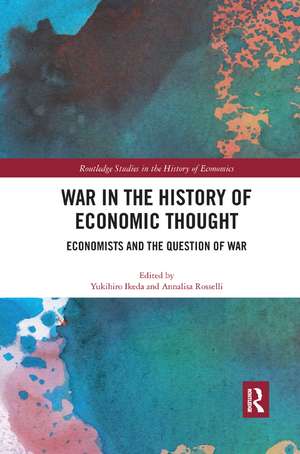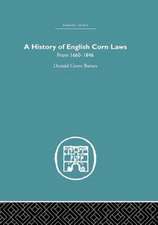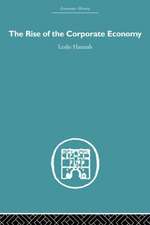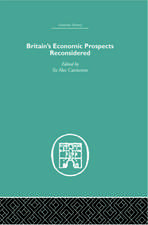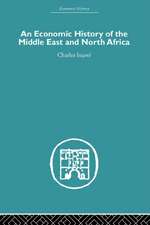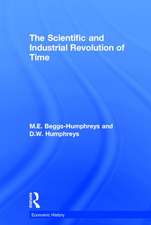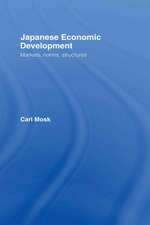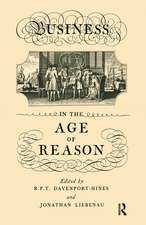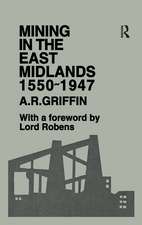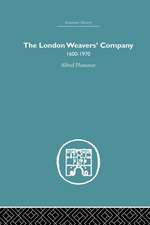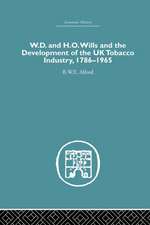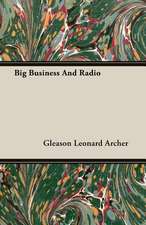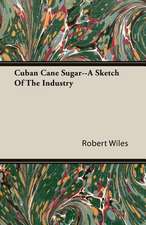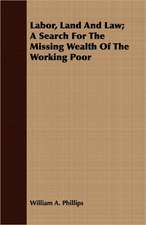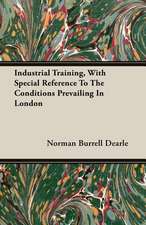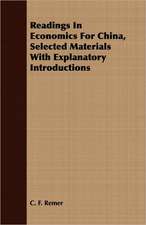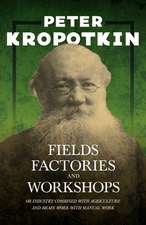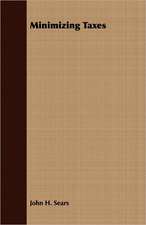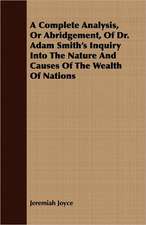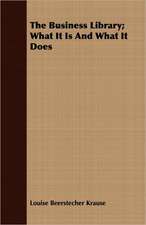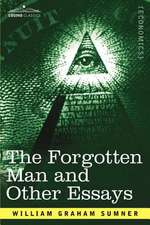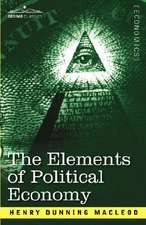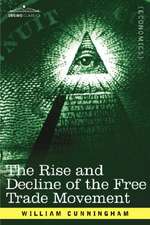War in the History of Economic Thought: Economists and the Question of War: Routledge Studies in the History of Economics
Editat de Yukihiro Ikeda, Annalisa Rossellien Limba Engleză Paperback – 5 iun 2019
This volume brings together contributions by leading international scholars of various countries and reconstructs how economists have dealt with issues that have been puzzling them for nearly three centuries: Can a war be 'rational'? Does international commerce complement or substitute war? Who are the real winners and losers of wars? How are military expenses to be funded?
The book offers a refreshing approach to the subject and how we think about the relations between economics and war.
| Toate formatele și edițiile | Preț | Express |
|---|---|---|
| Paperback (1) | 388.43 lei 6-8 săpt. | +150.02 lei 4-10 zile |
| Taylor & Francis – 5 iun 2019 | 388.43 lei 6-8 săpt. | +150.02 lei 4-10 zile |
| Hardback (1) | 766.26 lei 6-8 săpt. | |
| Taylor & Francis – 27 iul 2017 | 766.26 lei 6-8 săpt. |
Din seria Routledge Studies in the History of Economics
-
 Preț: 370.72 lei
Preț: 370.72 lei -
 Preț: 302.54 lei
Preț: 302.54 lei - 8%
 Preț: 392.82 lei
Preț: 392.82 lei -
 Preț: 311.28 lei
Preț: 311.28 lei - 9%
 Preț: 1003.10 lei
Preț: 1003.10 lei -
 Preț: 665.68 lei
Preț: 665.68 lei - 9%
 Preț: 935.39 lei
Preț: 935.39 lei -
 Preț: 384.63 lei
Preț: 384.63 lei -
 Preț: 280.74 lei
Preț: 280.74 lei -
 Preț: 326.99 lei
Preț: 326.99 lei -
 Preț: 318.31 lei
Preț: 318.31 lei -
 Preț: 214.15 lei
Preț: 214.15 lei -
 Preț: 310.43 lei
Preț: 310.43 lei -
 Preț: 326.82 lei
Preț: 326.82 lei -
 Preț: 308.97 lei
Preț: 308.97 lei -
 Preț: 324.46 lei
Preț: 324.46 lei -
 Preț: 395.81 lei
Preț: 395.81 lei -
 Preț: 392.71 lei
Preț: 392.71 lei - 26%
 Preț: 850.91 lei
Preț: 850.91 lei - 27%
 Preț: 995.39 lei
Preț: 995.39 lei - 18%
 Preț: 1005.01 lei
Preț: 1005.01 lei - 18%
 Preț: 1002.60 lei
Preț: 1002.60 lei - 26%
 Preț: 1046.46 lei
Preț: 1046.46 lei - 18%
 Preț: 1280.31 lei
Preț: 1280.31 lei - 18%
 Preț: 1055.51 lei
Preț: 1055.51 lei - 18%
 Preț: 1055.51 lei
Preț: 1055.51 lei - 28%
 Preț: 987.72 lei
Preț: 987.72 lei - 25%
 Preț: 824.17 lei
Preț: 824.17 lei - 18%
 Preț: 1061.93 lei
Preț: 1061.93 lei - 18%
 Preț: 716.32 lei
Preț: 716.32 lei - 18%
 Preț: 1006.07 lei
Preț: 1006.07 lei - 18%
 Preț: 1069.92 lei
Preț: 1069.92 lei - 12%
 Preț: 342.67 lei
Preț: 342.67 lei - 26%
 Preț: 991.34 lei
Preț: 991.34 lei - 18%
 Preț: 1056.00 lei
Preț: 1056.00 lei - 18%
 Preț: 1076.53 lei
Preț: 1076.53 lei - 18%
 Preț: 698.08 lei
Preț: 698.08 lei - 22%
 Preț: 332.02 lei
Preț: 332.02 lei - 18%
 Preț: 1169.78 lei
Preț: 1169.78 lei - 18%
 Preț: 1059.84 lei
Preț: 1059.84 lei - 30%
 Preț: 852.88 lei
Preț: 852.88 lei - 25%
 Preț: 830.10 lei
Preț: 830.10 lei - 18%
 Preț: 1125.78 lei
Preț: 1125.78 lei - 18%
 Preț: 1062.98 lei
Preț: 1062.98 lei - 18%
 Preț: 847.96 lei
Preț: 847.96 lei - 18%
 Preț: 953.01 lei
Preț: 953.01 lei - 18%
 Preț: 1168.76 lei
Preț: 1168.76 lei
Preț: 388.43 lei
Nou
Puncte Express: 583
Preț estimativ în valută:
74.32€ • 77.81$ • 61.50£
74.32€ • 77.81$ • 61.50£
Carte tipărită la comandă
Livrare economică 07-21 aprilie
Livrare express 28 februarie-06 martie pentru 160.01 lei
Preluare comenzi: 021 569.72.76
Specificații
ISBN-13: 9780367350734
ISBN-10: 0367350734
Pagini: 266
Ilustrații: 4 Tables, black and white; 1 Halftones, black and white; 1 Illustrations, black and white
Dimensiuni: 156 x 234 x 15 mm
Greutate: 0.42 kg
Ediția:1
Editura: Taylor & Francis
Colecția Routledge
Seria Routledge Studies in the History of Economics
Locul publicării:Oxford, United Kingdom
ISBN-10: 0367350734
Pagini: 266
Ilustrații: 4 Tables, black and white; 1 Halftones, black and white; 1 Illustrations, black and white
Dimensiuni: 156 x 234 x 15 mm
Greutate: 0.42 kg
Ediția:1
Editura: Taylor & Francis
Colecția Routledge
Seria Routledge Studies in the History of Economics
Locul publicării:Oxford, United Kingdom
Public țintă
Postgraduate and UndergraduateCuprins
Introduction (Yukihiro Ikeda and Annalisa Rosselli)
Part 1: Before the two World Wars
1. The Food Weapon: Milestones in the History of a Concept (17th-19th centuries) (Alain Clément and Riccardo Soliani)
2. Why the Wars? And How to Pay for them? A Comparison between Hume and Smith (Daniel Diatkine)
3. Hume and Smith on Morality and War (Shinji Nohara)
4. Industrialism and War in the French Social Sciences in Early 19th Century (Philippe Steiner)
5. Studying Economics as War Effort: The First Economic Treatise in the Ottoman Empire and its Militaristic Motivations (Deniz T. Kilincoglu)
6. Economic Non-intervention and Military Non-intervention in John Stuart Mill’s Thought (Philippe Gillig)
Part 2: Japan and World War Two
7. New Liberalism in Interwar Japan: A Study of the Magazine The New Liberalism (Simpei Yamamoto)
8. Economic Research in National Higher Commercial Schools in Wartime Japan (Tadashi Ohtsuki)
9. Yasuma Takata’s Theory on Power and Race (Tsutomu Hashimoto)
Part 3: Lessons from the 20th Century World Wars
10. How to Avoid War: Federalism in L. Robbins and W. H. Beveridge (Atsushi Komine)
11. The Wartime Economy and the Theory of Price Controls (Paolo Paesani and Annalisa Rosselli)
12. From Barter to Monetary Economy: Ordoliberal Views on the Post-WWII German Economic Order (Raphaël Fèvre)
13. The Transformation of Kenneth Arrow’s Attitude toward War (Nao Saito)
Index
Part 1: Before the two World Wars
1. The Food Weapon: Milestones in the History of a Concept (17th-19th centuries) (Alain Clément and Riccardo Soliani)
2. Why the Wars? And How to Pay for them? A Comparison between Hume and Smith (Daniel Diatkine)
3. Hume and Smith on Morality and War (Shinji Nohara)
4. Industrialism and War in the French Social Sciences in Early 19th Century (Philippe Steiner)
5. Studying Economics as War Effort: The First Economic Treatise in the Ottoman Empire and its Militaristic Motivations (Deniz T. Kilincoglu)
6. Economic Non-intervention and Military Non-intervention in John Stuart Mill’s Thought (Philippe Gillig)
Part 2: Japan and World War Two
7. New Liberalism in Interwar Japan: A Study of the Magazine The New Liberalism (Simpei Yamamoto)
8. Economic Research in National Higher Commercial Schools in Wartime Japan (Tadashi Ohtsuki)
9. Yasuma Takata’s Theory on Power and Race (Tsutomu Hashimoto)
Part 3: Lessons from the 20th Century World Wars
10. How to Avoid War: Federalism in L. Robbins and W. H. Beveridge (Atsushi Komine)
11. The Wartime Economy and the Theory of Price Controls (Paolo Paesani and Annalisa Rosselli)
12. From Barter to Monetary Economy: Ordoliberal Views on the Post-WWII German Economic Order (Raphaël Fèvre)
13. The Transformation of Kenneth Arrow’s Attitude toward War (Nao Saito)
Index
Notă biografică
Yukihiro Ikeda is Professor of History of Economic Thought at Keio University, Japan.
Annalisa Rosselli is Professor of History of Economic Thought at the University of Rome Tor Vergata, Italy.
Annalisa Rosselli is Professor of History of Economic Thought at the University of Rome Tor Vergata, Italy.
Recenzii
'While Marxists assert ubiquity of economic interest behind war motives, Albert O. Hirschman praised the cooling effect of commercial interest over the warlike passion. In any case, war and peace is one of the most significant themes that has motivated generations of economists for their investigation. What is the economic cause of the war, how to pay the war, what is the condition for the peace? Focusing such topics, historians of economic thought of the West and Japan gathered to offer their investigations into the ideas and deeds of economists that not only contributed the tradition of this discipline but also influenced general political orientations then.
In addition to the reflections on the Western and modern economists from 17th to 20th Century, this volume contains three chapters on Japanese economists before World War II: on the trend of new liberalism in interwar years, on the extensions of economic research in higher commercial schools, and peculiar view of a prominent economist (Yasuma Takata, called "A. Marshall in Japan" ) on power and race. In all they render a deep understanding of the intellectual atmosphere of Japan in the years flowing into the war that amalgamated liberalism, pragmatism, and all-embracing supra-racism.' — Kiichiro Yagi, Professor Emeritus, Kyoto University; President, Setsunan University
'The current volume presents selected papers from the fourth joint conference of JSHET and ESHET, i.e. the Japanese and European Societies for the History of Economic Thought. The meeting took place in Otaru, Hokkaido in September 2015 and focused on "War in the history of economic thought: the economists and the question of war". Unfortunately, this is a topical issue not only due to the centennial of WWI but even more so due to an escalation of resurgent nationalism, ethnic, religious, social and trade conflicts on a global level. The book covers a whole bunch of relevant issues, such as the concept of food weapon, how to pay for the war or price controls in wartime economies, analyzed by distinguished Japanese and European historians of economic thought. It comprises essays from (pre) classical economics via the cultural background of Japanese economists before WWII until the lessons drawn by leading modern economists after WWII. The volume is strongly recommended to all social scientists engaging for an international civil society.' — Harald Hagemann, Professor Emeritus of Economic Theory, University of Hohenheim, Stuttgart
In addition to the reflections on the Western and modern economists from 17th to 20th Century, this volume contains three chapters on Japanese economists before World War II: on the trend of new liberalism in interwar years, on the extensions of economic research in higher commercial schools, and peculiar view of a prominent economist (Yasuma Takata, called "A. Marshall in Japan" ) on power and race. In all they render a deep understanding of the intellectual atmosphere of Japan in the years flowing into the war that amalgamated liberalism, pragmatism, and all-embracing supra-racism.' — Kiichiro Yagi, Professor Emeritus, Kyoto University; President, Setsunan University
'The current volume presents selected papers from the fourth joint conference of JSHET and ESHET, i.e. the Japanese and European Societies for the History of Economic Thought. The meeting took place in Otaru, Hokkaido in September 2015 and focused on "War in the history of economic thought: the economists and the question of war". Unfortunately, this is a topical issue not only due to the centennial of WWI but even more so due to an escalation of resurgent nationalism, ethnic, religious, social and trade conflicts on a global level. The book covers a whole bunch of relevant issues, such as the concept of food weapon, how to pay for the war or price controls in wartime economies, analyzed by distinguished Japanese and European historians of economic thought. It comprises essays from (pre) classical economics via the cultural background of Japanese economists before WWII until the lessons drawn by leading modern economists after WWII. The volume is strongly recommended to all social scientists engaging for an international civil society.' — Harald Hagemann, Professor Emeritus of Economic Theory, University of Hohenheim, Stuttgart
Descriere
In this volume, which brings together contributions by leading international scholars of various countries, the book reconstructs how economists have dealt with issues that have been puzzling them for nearly three centuries and offers a reconstruction of three centuries of thinking about the relations between economics and war.
